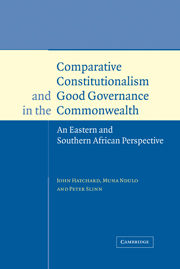 Comparative Constitutionalism and Good Governance in the Commonwealth
Comparative Constitutionalism and Good Governance in the Commonwealth Book contents
- Frontmatter
- Contents
- Preface
- List of cases
- List of constitutions
- List of statutes
- List of other instruments
- Map
- Introduction
- 1 The democratic state in Africa: setting the scene
- 2 Constitutions and the search for a viable political order
- 3 Devising popular and durable national constitutions: the new constitutions of the 1990s
- 4 Perfecting imperfections: amending a constitution
- 5 Presidentialism and restraints upon executive power
- 6 Enhancing access to the political system
- 7 Making legislatures effective
- 8 The judiciary and the protection of constitutional rights
- 9 The devolution of power to local communities
- 10 Developing autochthonous oversight bodies: human rights commissions and offices of the ombudsman
- 11 Seeking constitutional control of the military
- 12 Constitutionalism and emergency powers
- 13 Constitutional governance: the lessons from southern and eastern experience
- Bibliography
- Index
2 - Constitutions and the search for a viable political order
Published online by Cambridge University Press: 23 June 2009
- Frontmatter
- Contents
- Preface
- List of cases
- List of constitutions
- List of statutes
- List of other instruments
- Map
- Introduction
- 1 The democratic state in Africa: setting the scene
- 2 Constitutions and the search for a viable political order
- 3 Devising popular and durable national constitutions: the new constitutions of the 1990s
- 4 Perfecting imperfections: amending a constitution
- 5 Presidentialism and restraints upon executive power
- 6 Enhancing access to the political system
- 7 Making legislatures effective
- 8 The judiciary and the protection of constitutional rights
- 9 The devolution of power to local communities
- 10 Developing autochthonous oversight bodies: human rights commissions and offices of the ombudsman
- 11 Seeking constitutional control of the military
- 12 Constitutionalism and emergency powers
- 13 Constitutional governance: the lessons from southern and eastern experience
- Bibliography
- Index
Summary
A constitution enjoys a special place in the life of any nation. It is the supreme and fundamental law that sets out the state's basic structure including the exercise of political power and the relationship between political entities and between the state and the people. As the former Chief Justice of South Africa, Justice Ismail Mohammed, once observed, a constitution is not simply a statute which mechanically defines the structures of government and the relations between the government and the governed, but it is:
[A]mirror reflecting the national soul, the identification of the ideals and aspirations of a nation; the articulation of the values binding its people and disciplining its government.
It also shapes the organisation and development of a society both for the present and for future generations. As the Preamble to the Constitution of Uganda 1995 puts it:
we the people of uganda committed to building a better future by establishing a socio-economic and political order through a popular and durable national Constitution … do hereby … solemnly adopt, enact and give to ourselves and our posterity, this Constitution of Uganda.
This notion is in sharp contrast to that of the colonial period and much of the immediate post-colonial period. This chapter therefore examines the history of constitutionalism in the ESA states prior to 1990 and traces the reasons for the making of new constitutions in the 1990s.
- Type
- Chapter
- Information
- Comparative Constitutionalism and Good Governance in the CommonwealthAn Eastern and Southern African Perspective, pp. 12 - 27Publisher: Cambridge University PressPrint publication year: 2004


